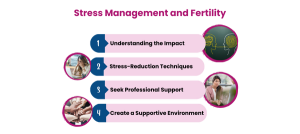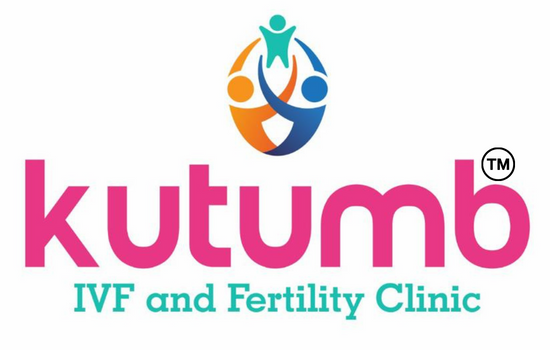Fertility Journey and Lifestyle Factors
Stress Management: Chronic stress can disrupt hormonal balance and affect fertility. Engage in stress-reducing activities like yoga, meditation, or regular exercise to support reproductive health.
Physical Activity: Moderate exercise helps maintain a healthy weight and hormonal balance, benefiting fertility. Avoid excessive exercise, which can negatively impact reproductive health.
Sleep Patterns: Aim for 7-8 hours of quality sleep per night. Good sleep supports hormonal regulation and overall reproductive health.
Environmental Factors: Minimize exposure to environmental toxins, such as pesticides and chemicals in plastics, which can affect hormone production and fertility. Opt for natural products and clean living environments when possible.
Importance of Nutrition for Fertility
Balanced Diet: Eating a well-balanced diet rich in fruits, vegetables, whole grains, and lean proteins provides essential nutrients for reproductive health. Include foods high in antioxidants, vitamins, and minerals to support fertility.
Healthy Fats: Incorporate sources of healthy fats, such as avocados, nuts, and olive oil, which are beneficial for hormone production and overall reproductive function.
Hydration: Staying well-hydrated supports optimal bodily functions, including those related to fertility. Aim for plenty of water throughout the day.
Limit Processed Foods: Reduce intake of processed and sugary foods, which can negatively impact hormone levels and overall health. Focus on whole, nutrient-dense foods to support fertility.
Exercise and Fertility: Finding the Right Balance
Exercise is a powerful tool for maintaining overall health and well-being, which can directly impact fertility. However, finding the right balance is crucial to optimizing its benefits for your fertility journey.
Moderate Exercise and Fertility: Engaging in regular, moderate exercise can help regulate hormones, improve blood circulation, and support a healthy weight—factors that are important for reproductive health. Activities such as walking, swimming, and yoga are gentle yet effective in promoting overall wellness.
Avoid Over-Exercising: While moderate exercise is beneficial, excessive physical activity can have the opposite effect. Intense exercise regimes or overtraining can disrupt menstrual cycles and negatively impact hormone levels, potentially affecting fertility. Aim for a balanced approach, incorporating exercise into your routine without overdoing it.
Tailor Your Routine: Consider your personal fitness level and health goals when designing your exercise routine. If you’re unsure about how much exercise is appropriate, consulting with a healthcare provider or a fitness specialist can help tailor a plan that supports your fertility while promoting overall health.

Stress Management and Fertility
Stress is a common factor that can influence fertility, and managing it effectively is crucial for anyone on their fertility journey.
Understanding the Impact: Chronic stress can lead to hormonal imbalances that affect ovulation and menstrual cycles, potentially making it harder to conceive. By managing stress, you can create a more conducive environment for your body to focus on reproductive health.
Stress-Reduction Techniques: Incorporate stress-reduction practices into your daily routine. Techniques such as mindfulness meditation, deep breathing exercises, and progressive muscle relaxation can help lower stress levels and improve emotional well-being. Engaging in hobbies, spending time with loved ones, and practicing relaxation techniques can also be beneficial.
Seek Professional Support: If stress is overwhelming, consider seeking support from a mental health professional or counselor. Therapy can provide strategies for coping with stress and addressing any emotional barriers that may be impacting your fertility journey.
Create a Supportive Environment: Building a supportive network of friends, family, or support groups can also play a significant role in managing stress. Sharing your experiences and seeking encouragement from others can provide emotional support and help you navigate the challenges of your fertility journey.
Environmental Factors and Fertility
Enhancing fertility involves more than just diet and medical treatments; environmental factors play a significant role. Here’s how to create a fertility-friendly environment:
1. Avoid Harmful Chemicals: Opt for organic produce, use eco-friendly cleaning products, and choose personal care items free from parabens and phthalates.
2. Limit Pollutants: Monitor air quality, use air purifiers, and filter your water to reduce exposure to environmental contaminants.
3. Maintain a Healthy Weight: Eat a balanced diet and exercise regularly to support overall reproductive health.
4. Manage Stress: Practice relaxation techniques and build a supportive network to help manage stress.
5. Reduce EMF Exposure: Limit the use of electronic devices close to your body and use EMF shields if necessary.
Conclusion
Making positive lifestyle changes can significantly enhance your fertility journey. Emphasize a healthy diet, regular exercise, and stress management. If you need professional help, consider Fertility Treatment in Vizag to support your path to conception. Every improvement in your lifestyle brings you closer to your goal of becoming a parent.

